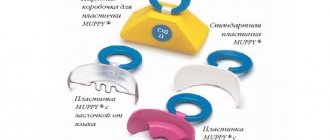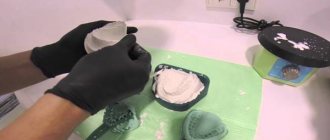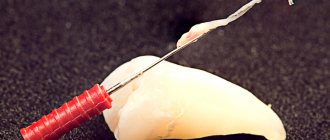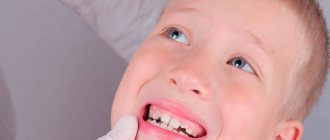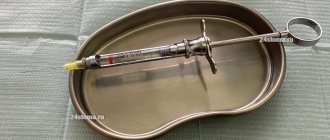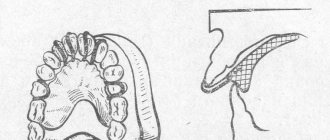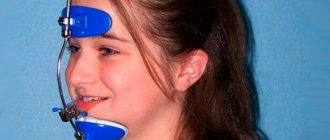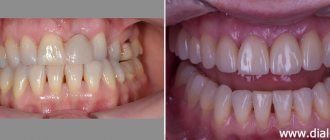Today it is very important to maintain the health and beauty of your smile. Regular visits to the dentist will help prevent serious diseases and correct existing problems. An experienced specialist will be able to identify the problem in a timely manner and eliminate it, thus saving your money. One of the best dentistry in Moscow is the Orthodont City clinic. We carefully approach each of your requests. Our clinic employs certified specialists who are attentive to detail and have the highest knowledge in the field of orthodontics, prosthetics and implantology.
Who needs the help of an orthodontist?
Incorrect bite, trema and diastema, crowded teeth or dental units standing at different angles - if you have any of the listed dental defects, you definitely need to consult an orthodontist!
Modern orthodontist dentistry PROFI-Dent has many effective techniques that allow you to achieve excellent results even in the most difficult clinical cases:
- advanced braces systems (lingual, self-ligating, non-ligating);
- records;
- various types of mouth guards;
- retainers.
We employ some of the best orthodontists in Moscow, who have unique experience in successfully solving various defects of the dental system. It is impossible to cope with the problems of malocclusion and crooked teeth without a specialist; you shouldn’t even try! Only an experienced orthodontist can correctly assess the condition of the dental system and correctly develop a treatment plan.
Stages of treatment
Orthodontic therapy involves several stages:
- diagnostics (visual and hardware);
- selection of an orthodontic device and development of a treatment regimen;
- sanitation of the oral cavity (elimination of dental and periodontal diseases, professional cleaning);
- installation of the selected fixed appliance on the patient’s teeth (or familiarization with the principles of fixing removable devices);
- wearing an orthodontic device;
- removal of the device;
- retention stage to consolidate the achieved results.
Attention: the duration of the main and retention stages is set by the attending physician depending on the characteristics of a particular case. Failure to follow the recommendations may result in the teeth returning to their previous position.
Why do you need to correct crooked teeth?
Anomalies of the bite and dentition must be corrected. If everything is left as is, the result will be disappointing:
- hygiene problems;
- caries;
- increased tooth wear;
- loss of one or more teeth;
- disorders of the temporomandibular joint;
- problem with the respiratory and digestive system.
That is, crooked teeth and malocclusion are not only unsightly, but also dangerous for overall health!
Orthodontic treatment at PROFI-Dent dentistry is an opportunity to shine with a flawless smile, without a significant investment of time, effort and money.
Make an appointment
In order to make an appointment at the Orthodont City dental center, you must contact the clinic using the phone number listed in the “Contacts” section on the website. The administrator will certainly answer all your questions and also make an appointment with the doctor. To begin with, the patient is scheduled for an initial examination to receive a consultation at a convenient time. A visual examination will enable the doctor to obtain general information about the health of the patient’s teeth and oral cavity.
The dental center in Moscow “Orthodont City” provides high-quality service, and, as a result, positive reviews from satisfied patients. Get to know us better and you will see for yourself.
You can make an appointment with us by phone: +7 or using a special form on our website.
Advantages of contacting ProfiDent
If you want to smile widely without being embarrassed, come to the best orthodontist PROFI-Dent dentistry.
According to statistics, almost 80% of the inhabitants of our planet have one or another orthodontic problems:
- malocclusion;
- uneven teeth, noticeably different from the rest in shape, size and location;
- improperly formed dentition;
- curvature of the jaw, etc.
PROFI-Dent is a modern orthodontic dentistry in Moscow, and problematic teeth are not a difficult task for our specialists. The use of advanced technologies and an integrated approach to orthodontic treatment make it possible to quickly transfer a patient from the status of “needs immediate orthodontic help” to the “prevention” group.
Surgical orthodontics at NKclinic
In case of complex malocclusions, significant deformation of the jaws, when the patient has a strongly protruding chin or a gummy smile, treatment is carried out using orthognathic surgery. The word “orthognathic” is formed from the words “straight” and “jaw”. In practice, this means that the purpose of this operation is to align the contours of the dental system.
There are skeletal deformities in which the use of orthodontic structures (Invisalign, external and lingual braces) or orthopedic restorations (veneers, crowns, feldspathic onlays, luminars) does not allow achieving the desired and correct bite.
Surgery
This method is used in very complex cases when other methods cannot guarantee the effectiveness of the correction.
These are the situations:
- the dental arch(s) are significantly deformed;
- There is a serious disproportion between the upper and lower jaws.
Surgery is necessary to form the correct position of the jaw bones and rotate the teeth around their axis. Often surgery is performed as a preparation for a hardware course of therapy. For example, removal of excess teeth in order to create free space for the movement of teeth, plastic surgery of the frenulum of the tongue.
Aligners (aligners)
Aligners
– a progressive and quite comfortable method of correcting pathologies of the dental apparatus of minor and moderate severity. This is a transparent plastic product that is worn over the teeth. For each patient, several sets are individually manufactured, each of which differs from each other by a slight change in geometric parameters. The patient independently changes the aligners in accordance with the treatment regimen, the teeth gradually move into the desired position. The most relevant models are those specially designed for children and adolescents, for example, FlexiLigner (“flexics”) and KidsLight, as well as universal Invisaling aligners.
Records and trainers
These devices are removable. Plates are used in children during the period of primary and mixed dentition. The design consists of a polymer plate adjacent to the upper palate, with a metal arch built into it, which is fixed to the teeth. Some models have elements that allow you to change the size of the record. Samples of plates for children under three years of age resemble a pacifier. Details of this design prevent the jaws from closing incorrectly. Trainer
is an orthodontic mouthguard for both jaws, on the inside of which grooves for teeth are applied. When putting on the trainer, the dentofacial apparatus takes the correct anatomical position, the muscles get used to this state (“train”) and subsequently themselves hold the jaws in the desired position.
Braces
Fixed orthodontic structures. They are classified according to several defining characteristics:
- positioning location. They can be vestibular (fixed on the outer side of the dentition) and lingual (installed on the inner side);
- method of attaching the power arc to the bracket pads. They are divided into ligature (fastening using ligatures - plastic rings or wires) and non-ligature (attached with small clip-locks);
- material of manufacture. The most popular are metal and ceramic products.
According to experts, the following models are considered the most popular:
- lingual non-ligature metal: WIN, INCOGNITO;
- vestibular non-ligature metal: Damon Q, H4;
- vestibular non-ligature ceramic: Damon Clear;
- vestibular metal ligatures: Biomim, Victory;
- vestibular ligature ceramic: Advanced, Hype.
You should take your child to a pediatric orthodontist only when he has all his permanent teeth.
Orthodontist, candidate of medical sciences Tatyana Gevorkyan comments:
Unfortunately, this attitude towards orthodontic treatment among parents in childhood is a myth, very widespread and, alas, harmful. Very often, dentists themselves contribute to this myth about pediatric orthodontists. I don’t really want to comment on the degree of immersion in the issues of pediatric orthodontics of these specialists and their competence, but discussions about the advisability and necessity of the so-called early orthodontic treatment (that is, in childhood) do not subside to this day. And again, sometimes this situation actually happens: a child began undergoing orthodontic treatment in preschool or early school age, both the child and the parents tried, wore, and monitored the wearing of the orthodontic apparatus, and when the bite changed, the children’s orthodontist still installed braces. system...
A question immediately arises, mixed with parental indignation: why did the pediatric orthodontist have to “torment” the child for so long when he was given braces anyway?!! This is where this myth comes from: whatever one may say, braces are, like, the coolest thing for children’s and adult orthodontists, which solves all problems “at once.” But no! The braces system does not solve all the problems of orthodontic treatment in a child.
Orthodontic treatment in childhood is the fastest and most effective!
Growing patients—children and adolescents—are the most rewarding environment for a pediatric orthodontist to work in. Why? Everything is very simple and lies on the surface: in children and adolescents, the processes of growth, renewal, and metabolic processes are most active. Therefore, the same orthodontic force applied to a growing and non-growing patient can produce completely different results, with an advantage, of course, in growing patients.
In a very large percentage of cases, with timely initiation of orthodontic treatment in children, the need to install braces can be avoided. Here, of course, good, if not excellent, cooperation (that is, help from the pediatric orthodontist) on the part of the patient himself and, of course, the patient’s parents is extremely important, because children and adolescents very often still lack the motivation to follow the orthodontist’s recommendations. However, orthodontics is not magic... It also happens that the anomaly is so serious that the potential of simpler devices is not enough. In such cases, we, orthodontists, are forced to fix the braces in order to complete the treatment. But! A pediatric orthodontist should always warn parents that with conscientious early orthodontic treatment, we will in any case avoid more complex and severe pathology, thereby reducing the time of wearing braces in the future (or aligners in adolescence). This is also extremely important.
In this video, famous orthodontist Alexey Trezubov recommends young boys and girls to correct their teeth using aligners. They are invisible, light and comfortable to wear. Much better than braces, which are visible on the teeth, which you are tortured to brush constantly, since everything gets stuck in them and it is impossible to eat normally! In general, aligners are already a stable youth trend:
Thus, let’s sum up an intermediate result on orthodontic treatment in childhood: indeed, braces can correct a lot during orthodontic treatment, but wearing braces is a rather serious test for the body, and if there are options to avoid wearing braces or shorten the period of their use, then it is better do it. And early orthodontic treatment in children is the very option when it is possible to prevent a more serious anomaly, and therefore reduce the likelihood of the need for a pediatric orthodontist to install braces or reduce the likelihood of wearing them. Therefore, do not delay: it is better to go with your child, starting from the age of 3-4 years, for a consultation with a pediatric orthodontist and get all the information, than then frantically look for the most “light”, that is, easy options for solving problems where more serious orthodontic treatment is already required treatment with mouth guards.
How is the cost of orthodontic therapy determined?
The price of an occlusion correction course for different patients can vary significantly.
The final cost depends on the following factors:
- volume of diagnostic studies. Thus, diagnostics for therapy using aligners and plates are much cheaper than those when planning treatment using braces;
- the type of therapy chosen by the doctor (plates, aligners, braces);
- models of orthodontic apparatus. The cost of products may vary significantly;
- complexity of the clinical case. The more complex the defect, the longer the treatment will take.
Myogymnastics
This correction method is functional and involves training the facial and chewing muscles that keep the jaw system in the correct position. The exercises are effective when the child is between 3 and 5 years old. At an older age, myogymnastics is used as an additional method of correction, i.e., simultaneously with wearing removable or fixed orthodontic devices. The condition for the effectiveness of using the described method is the regularity of the exercises. Therefore, the main burden in treating young children falls on their parents.
How is malocclusion treated during orthodontic treatment?
Today, orthodontists use several technologies that can correct misaligned teeth. There are many of them: plates, braces, aligners, twin blocks, etc. We'll show you the three most popular ones.
First technology - orthodontic plates
The main advantage of such plates is that they are removable. Depending on the condition of the bite, they can be worn around the clock or put on only at night. Due to the questionable effectiveness of treatments, they are practically not used, or are used only in the simplest cases.
The second technology of orthodontic treatment is braces.
Absolutely everyone knows about braces. Previously, these were ugly metal staples that turned the smile of the Jaws character from the James Bond film into a grin,
Today, braces are quite aesthetic and easy to use. According to the design on the teeth, braces are a permanent structure, that is, they are worn for a certain time (1-3 years), without ever being removed. Braces come in many types, such as self-ligating, ceramic, sapphire and lingual. Only the last of these, lingual braces, are invisible during orthodontic treatment.
The third technology of orthodontic treatment is aligners.
This technology, which appeared about 30 years ago, has reached us in a much improved form. The obvious advantage of aligners is that they are removable and invisible when worn. That is, the patient’s orthodontic treatment goes unnoticed by others. Even if a person corrects his teeth using this technology, no one will guess that he is wearing clear aligners. The disadvantage is that it does not correct all types of bites, although the most basic pathologies are easily treated with aligners.
The advantage of orthodontic treatment with aligners is the opportunity to see the results of your treatment BEFORE it begins. This opportunity is provided to the patient thanks to a special computer program - a virtual 3D setup. See for yourself how a bite is corrected using aligners, it’s a very exciting process:
Orthodontic treatment for straightening central upper teeth
This video discusses a case of orthodontic treatment, when a patient consults an orthodontist in order to correct the position of the two central incisors on the upper jaw: he has a changed position of one upper incisor (quite strong) - the incisor is rotated along the axis, and, let’s say, deviated with the edge forward.
That is, from a cosmetic point of view, we understand perfectly well that this is not a very beautiful position of the central teeth and, naturally, we want to correct it. The aligners dealt with this problem perfectly.
Orthodontic treatment of crossbite
The very name of crossbite already contains a small meaning of such a pathology, which is not always easy for orthodontic treatment. And the presented clinical case is no exception. In this case, the patient had a situation where the upper teeth, the upper dentition, are quite narrow. It turns out that the lower teeth OVERLOAD the outer surface of the upper teeth. Everything should be the other way around: our upper jaw should be wider and larger than our lower jaw. In addition, in the video we will see the deformation and incorrect position of the front teeth in the upper jaw, in particular, the so-called “lateral incisors”: they are in the posterior, palatal position. And again, as in the previous case, the aligners did an excellent job of solving the problem during the patient’s orthodontic treatment.
Orthodontic treatment when the fangs are crooked and need to be corrected
This video examines a rather interesting case. We will see with you not just the alignment of individual teeth and the magic of how aligners work, but we will also see HOW, with the help of aligners, we can correct the bite during orthodontic treatment.
Pay attention to the position of the lower canines. They are very much rotated along the axis. Orthodontists call this “rotation.” Therefore, here we present a rather complex movement during orthodontic treatment with aligners, a complex correction, since a canine is a fairly powerful tooth and we do not always easily cope with such problems even with braces. But again, the aligners did a great job!
Orthodontic treatment of crowded teeth using aligners
This video shows an example of a clinical case of crowded teeth, where not very straight front teeth become a beautiful, even, wide smile during orthodontic treatment with aligners.
Pay special attention to the upper jaw, where you can see excessive inclination of the front teeth, that is, when the teeth tilt very much back. In response to this, other teeth - the lateral incisors - visually seem to be tilted forward. From the inside we will see a not very even upper dentition, that is, the upper jaw has the shape of a trapezoid, the teeth are crowded, which is not the norm - after all, our jaw should be semicircular, semi-ellipsoidal, wide, bright.
And if you look at the lower jaw, you can also see a fairly high crowding of the teeth, a high, close position of the lower incisors. This is very common in almost all of us.
. And doctors very often hear from patients that it is very difficult to brush such teeth, and therefore there is a lot of dental plaque. With such crowded teeth, a person will always experience discomfort and seek professional hygiene.
As a result of orthodontic treatment with aligners, crowded teeth were completely eliminated and all the patient’s problems were a thing of the past!
Cost of orthodontic treatment with Star Smile aligners
The Star Smile company is a leading Russian manufacturer of aligners and therefore offers you the most comfortable and reasonable prices for orthodontic treatment. Star Smile is represented by certified specialists in more than 70 cities of Russia and neighboring countries.
Installment plans will also help you effectively begin orthodontic treatment: patients have the opportunity to undergo orthodontic treatment at a cost of:
- for the simplest case of correction from 6,000 rubles
per month - in the most difficult case of teeth straightening - less than 10,000 rubles
per month
Realistically, today these are the lowest possible prices for aligners in Russia!
Find out the prices for orthodontic treatment with aligners for your pathology
